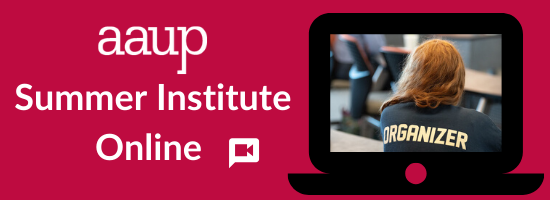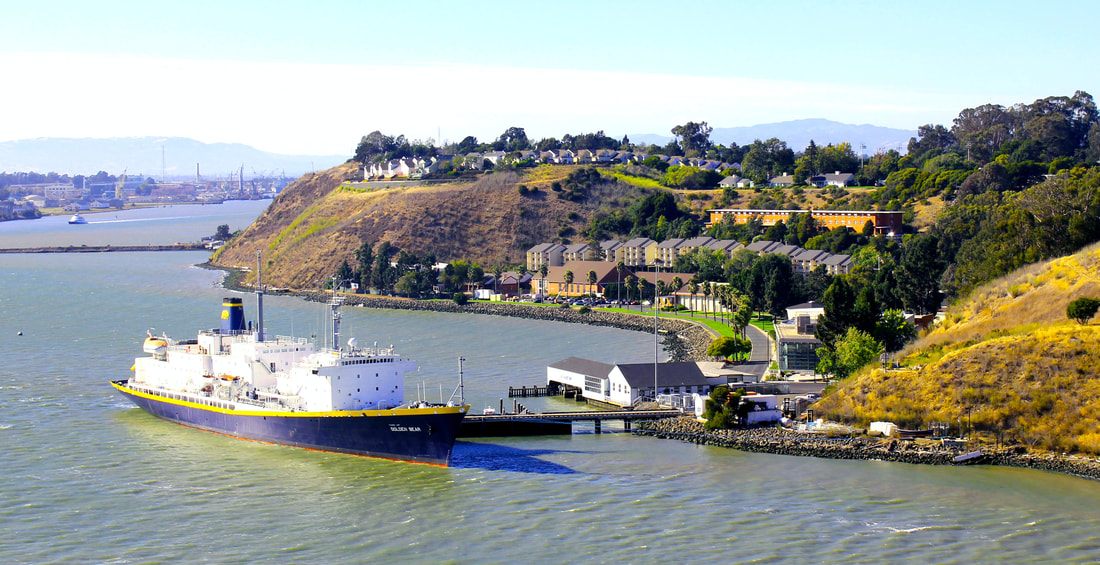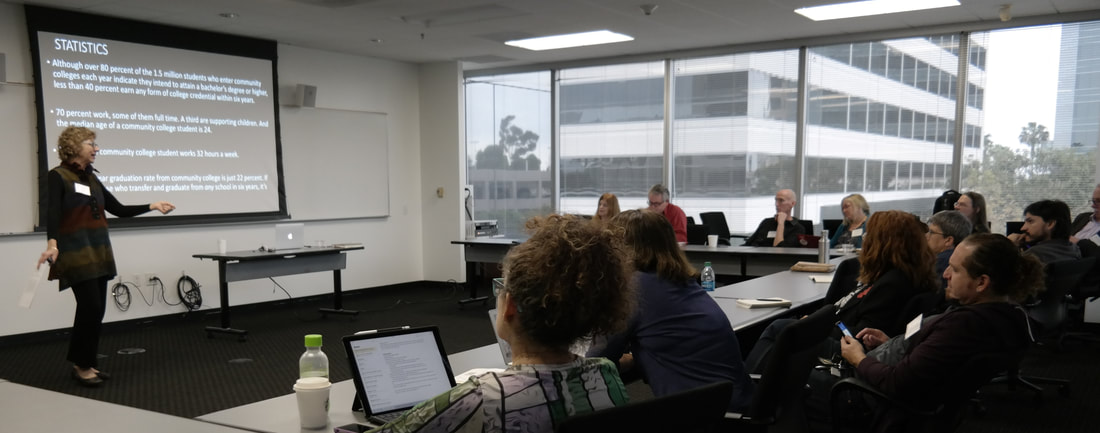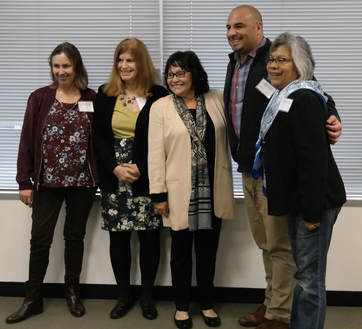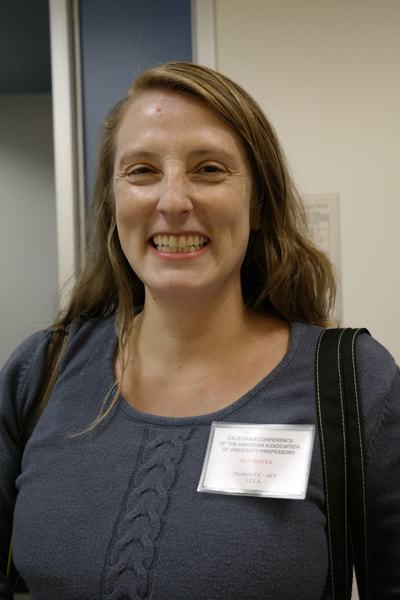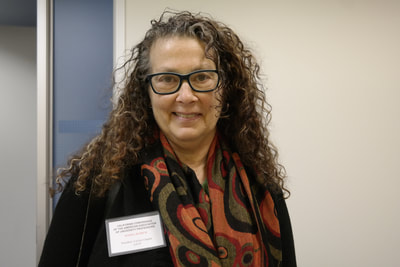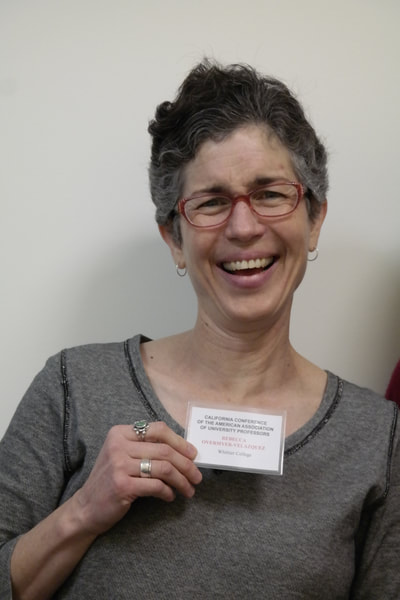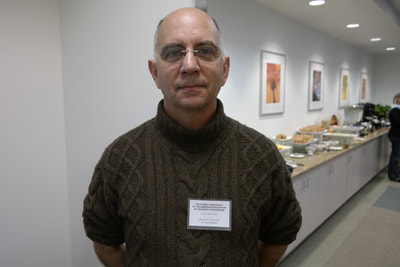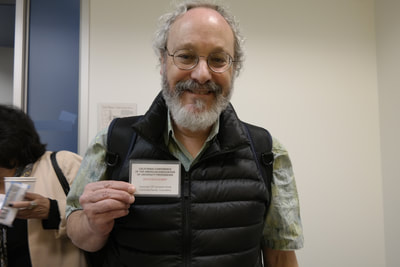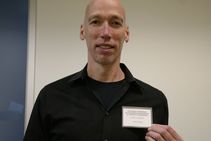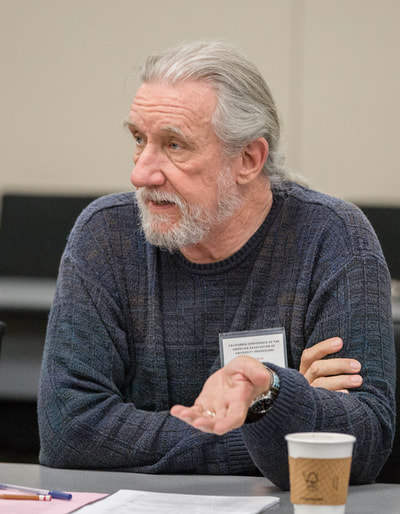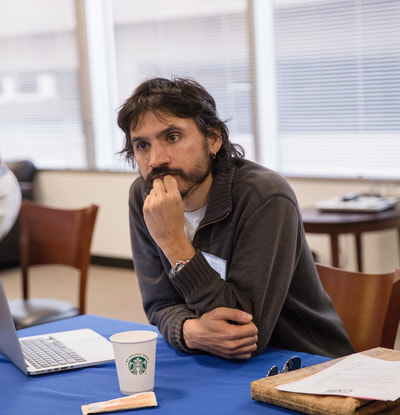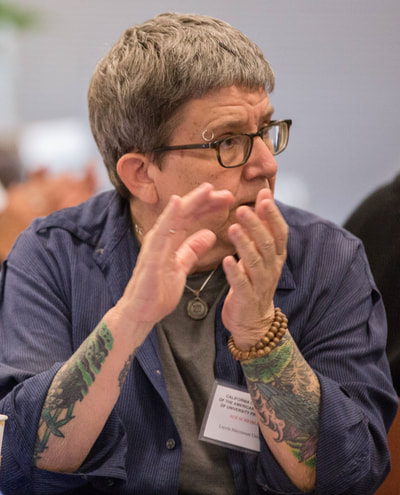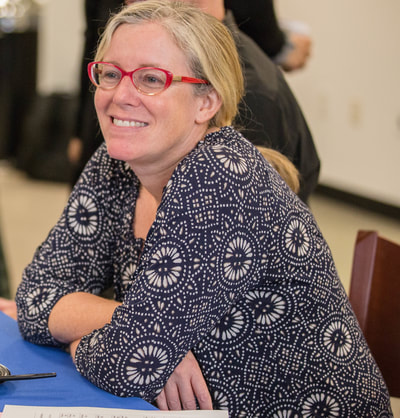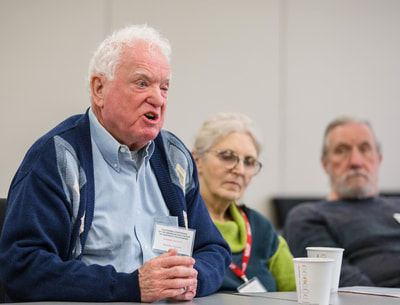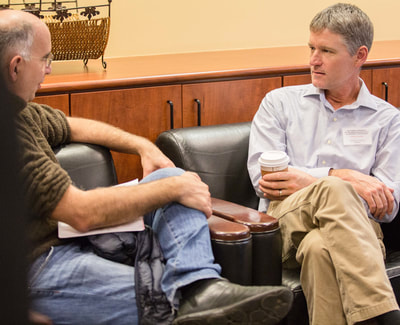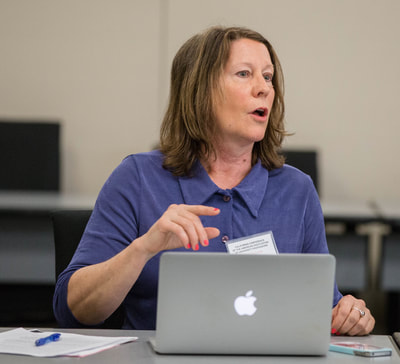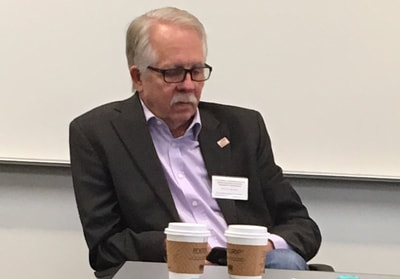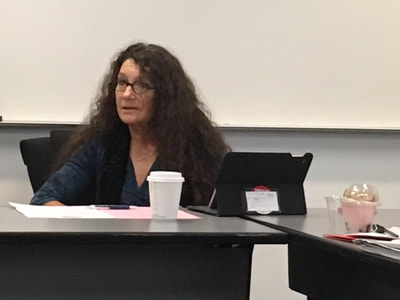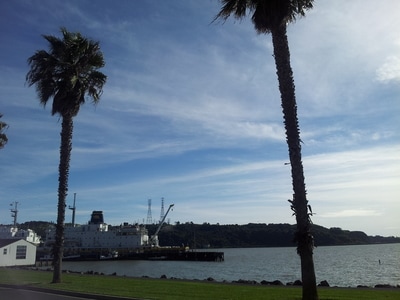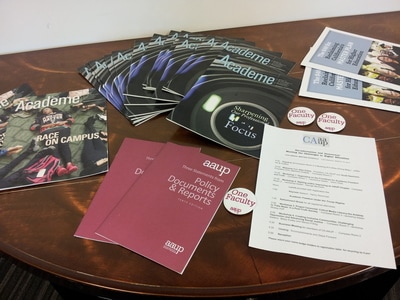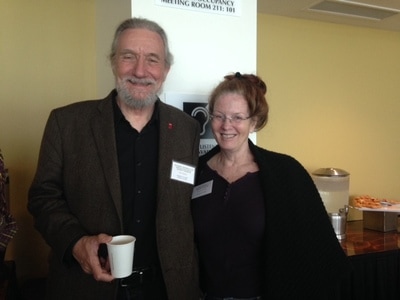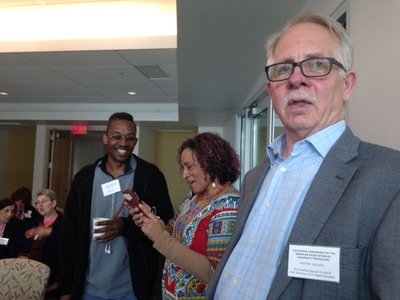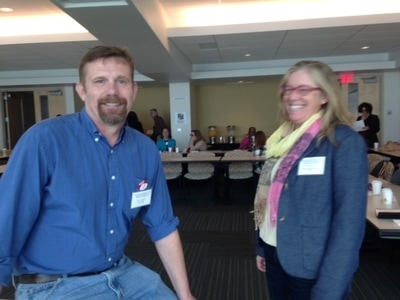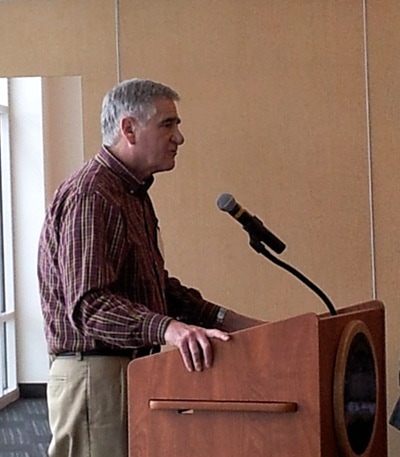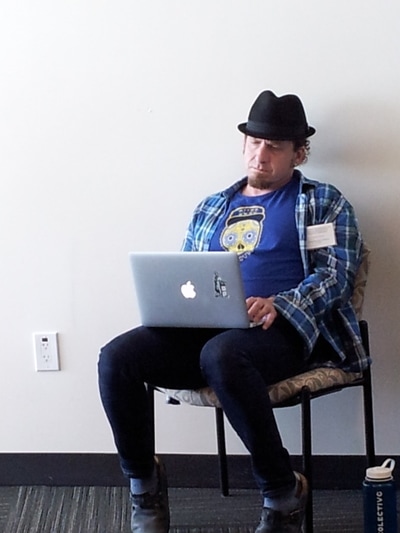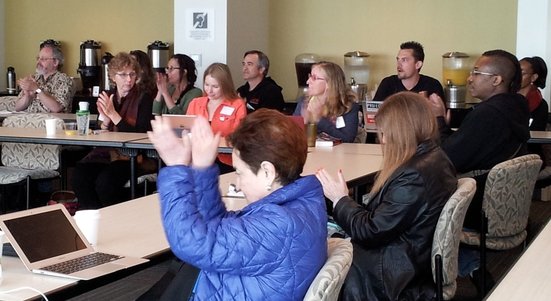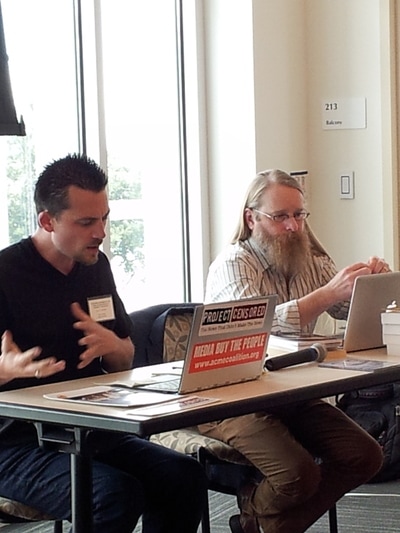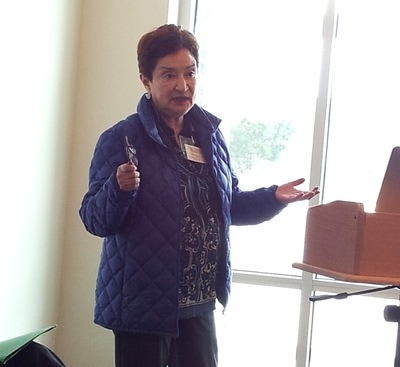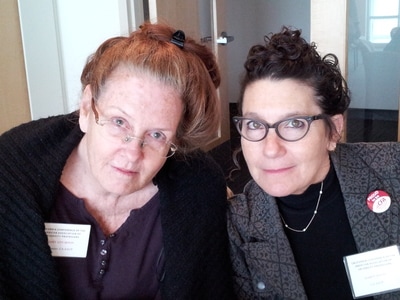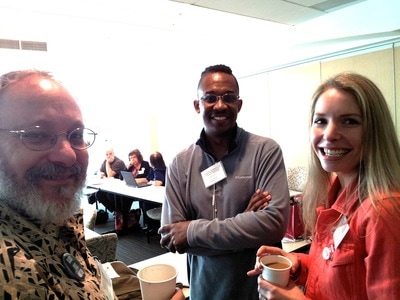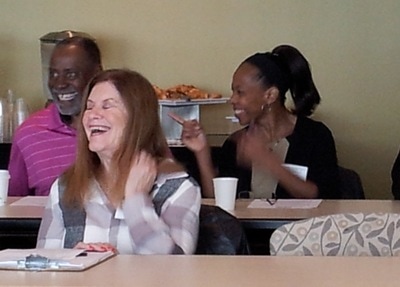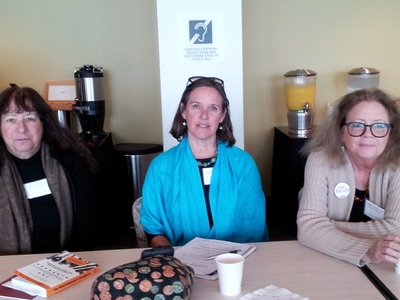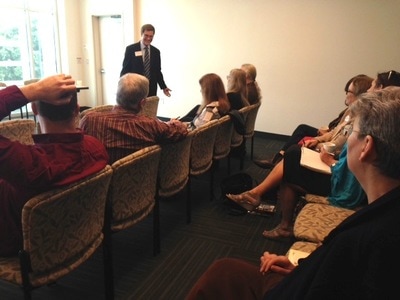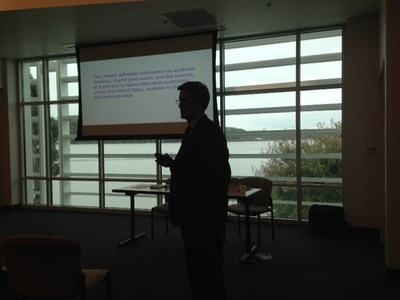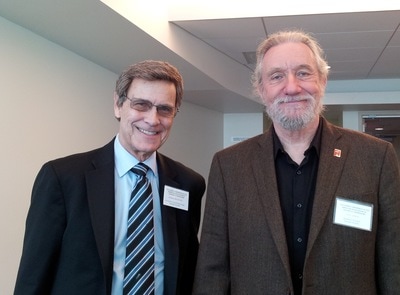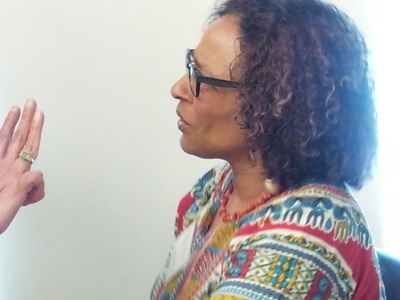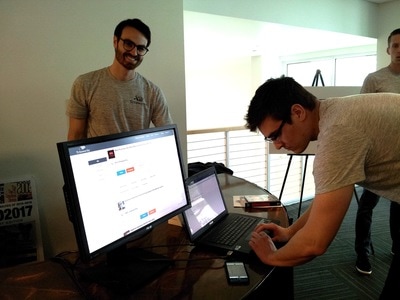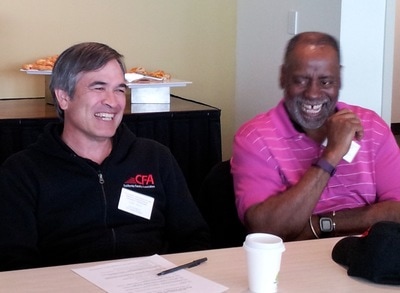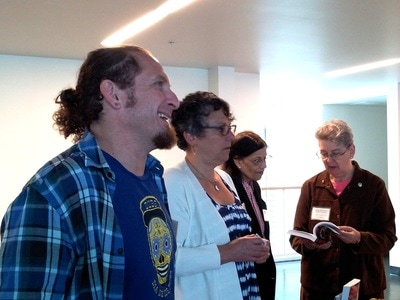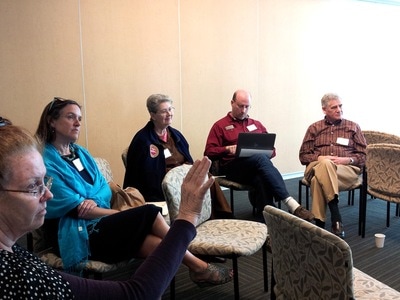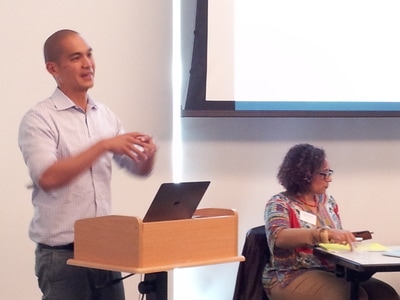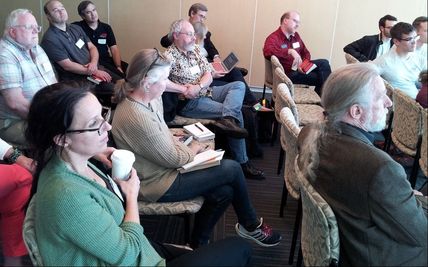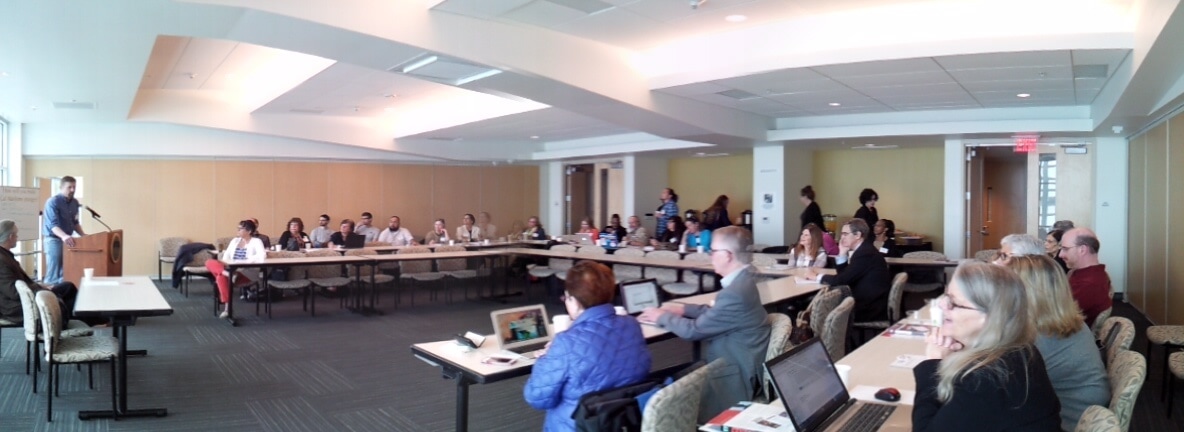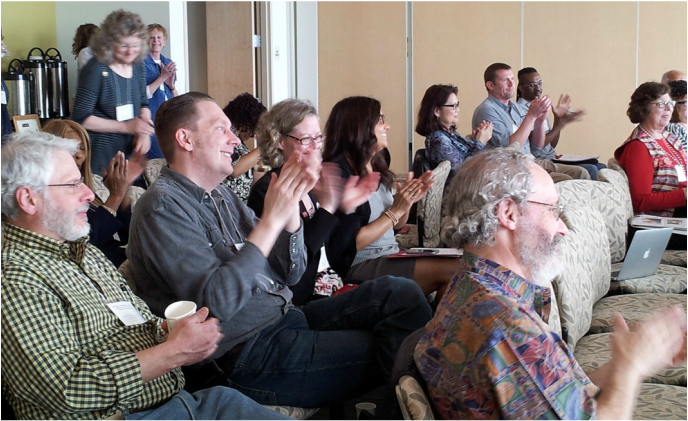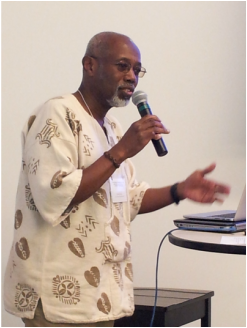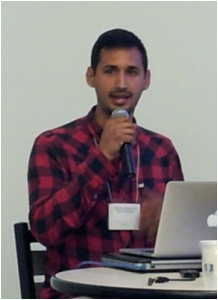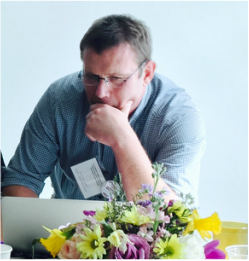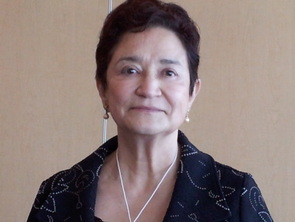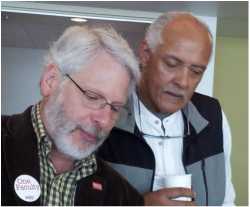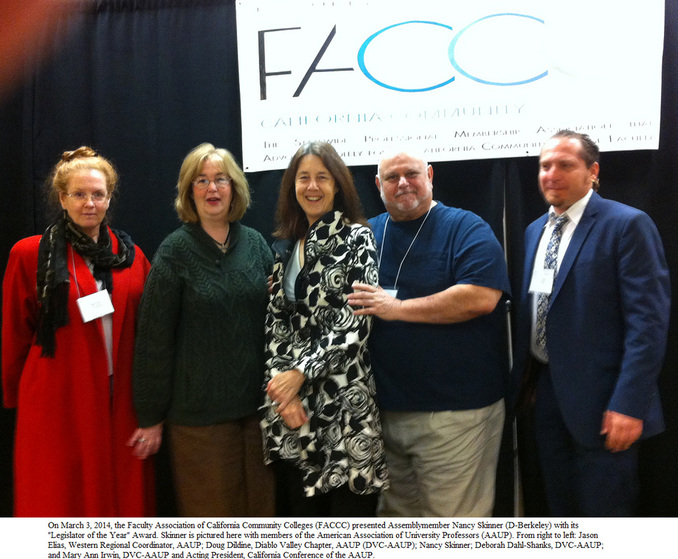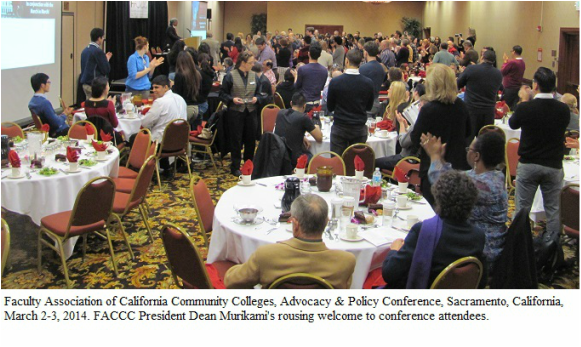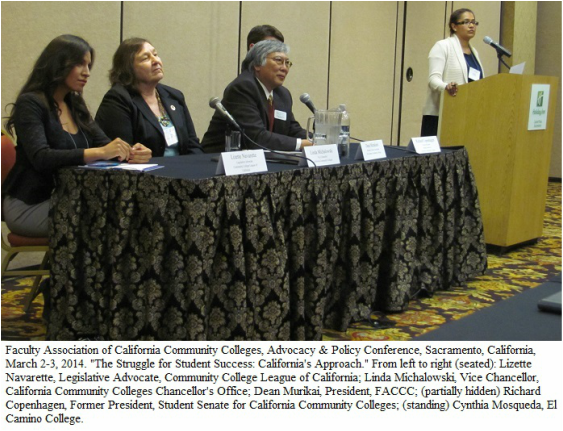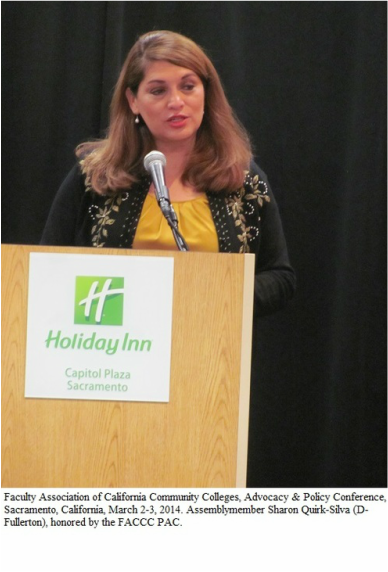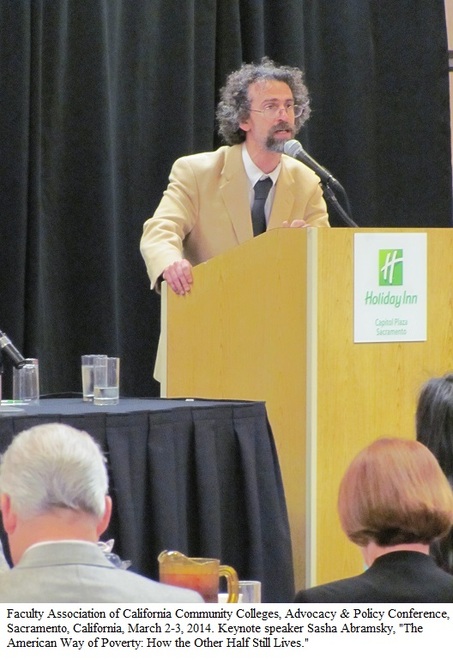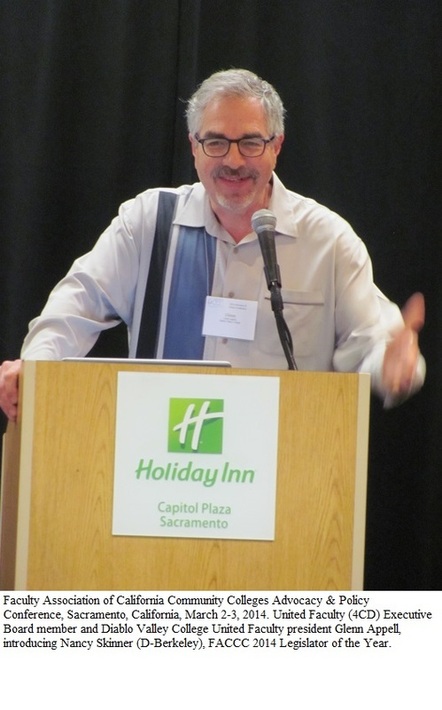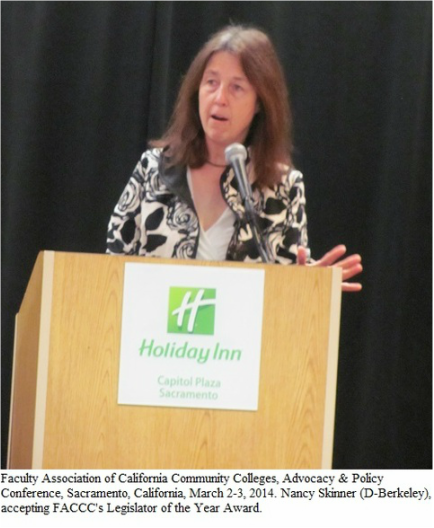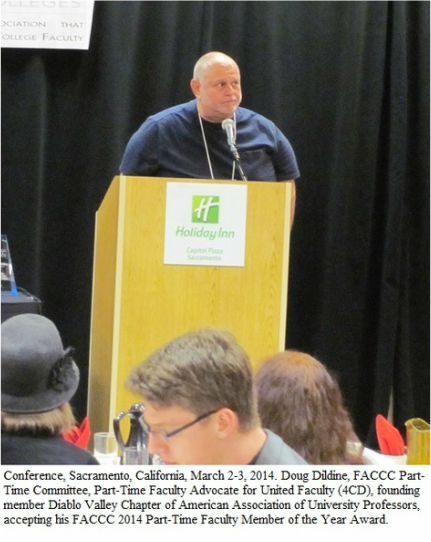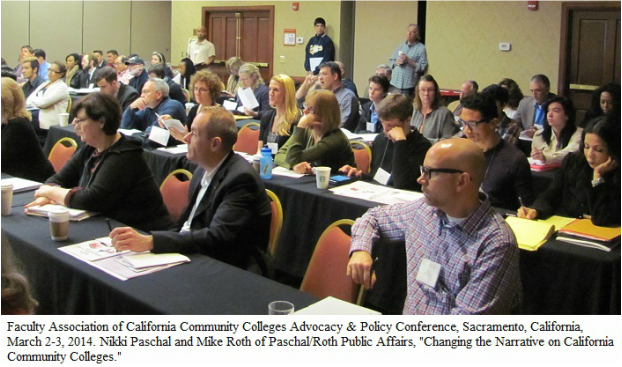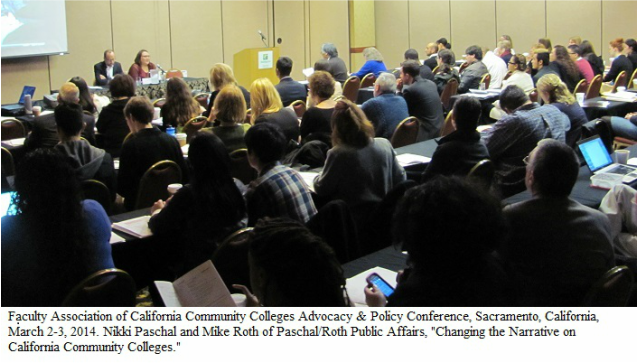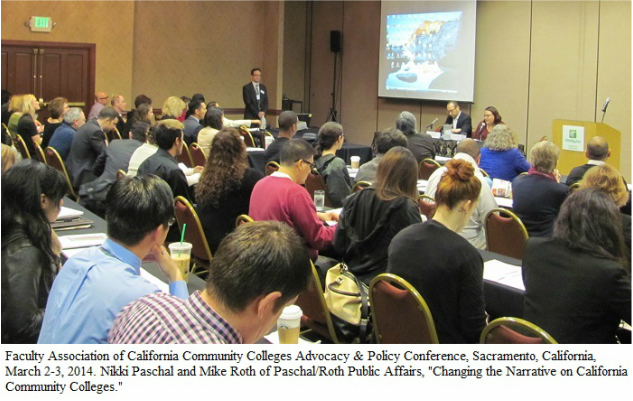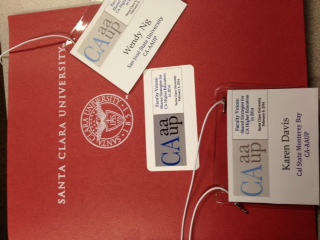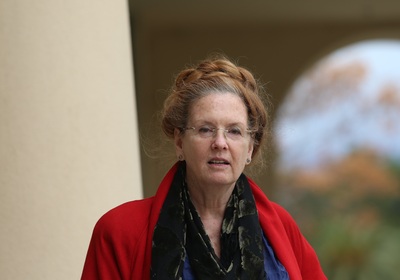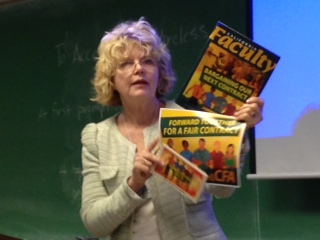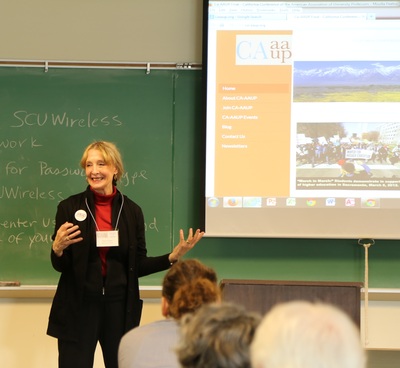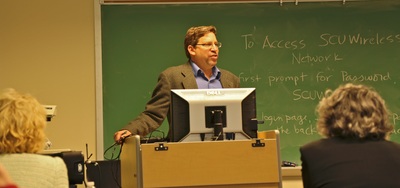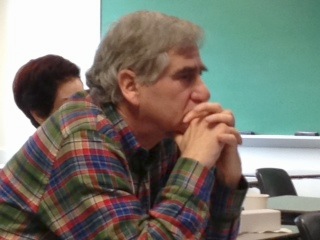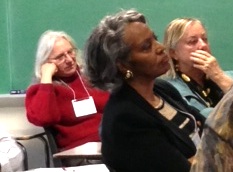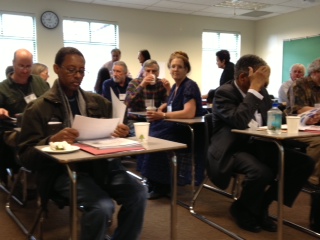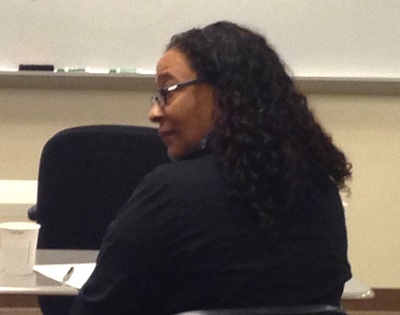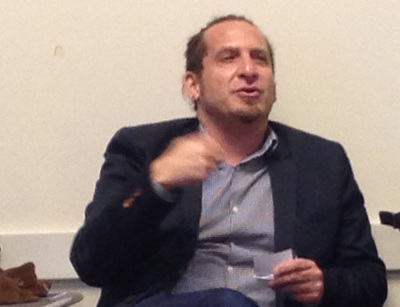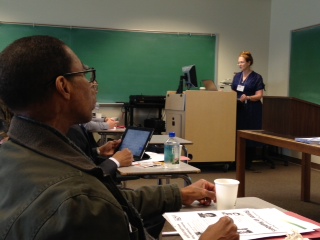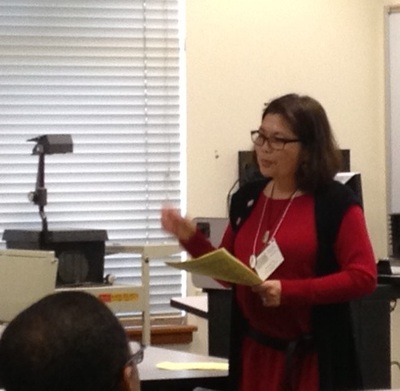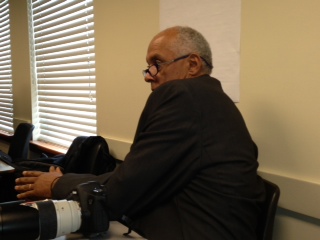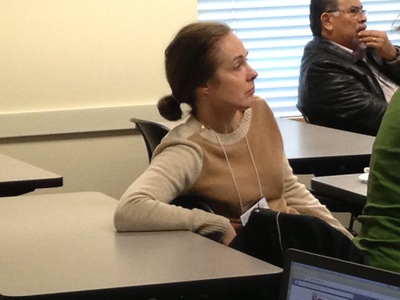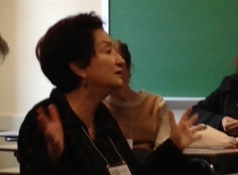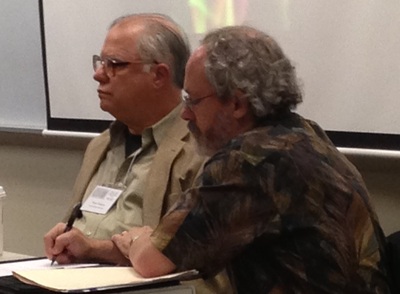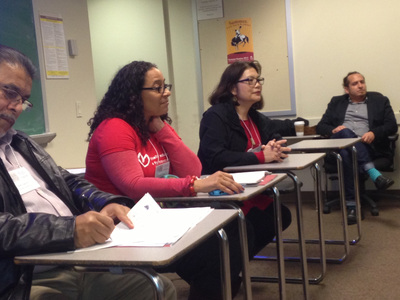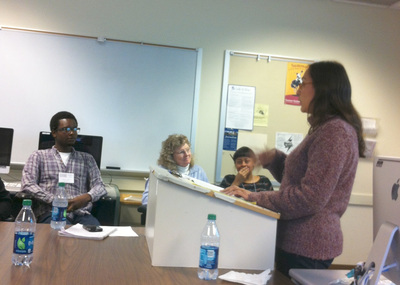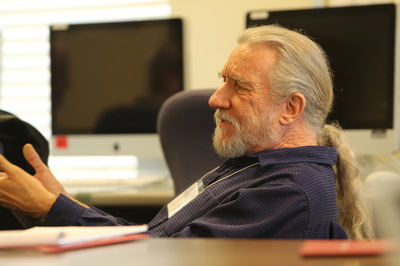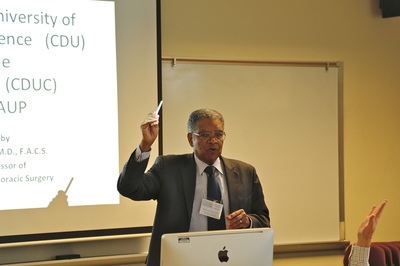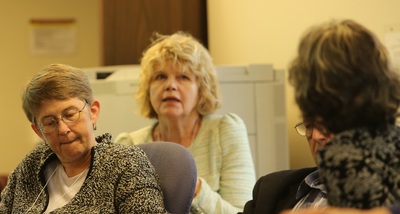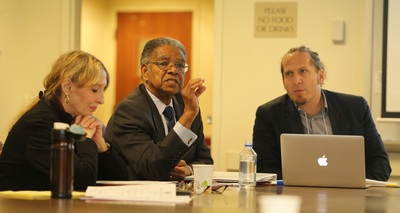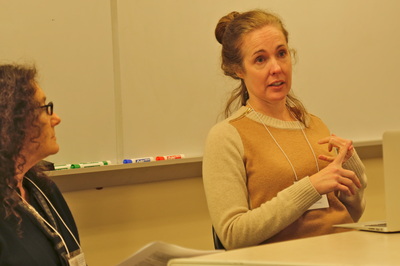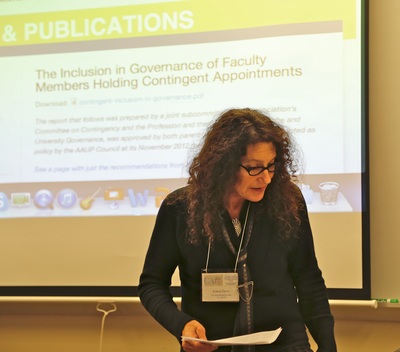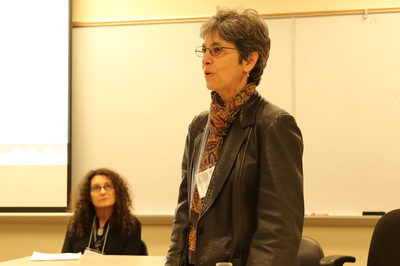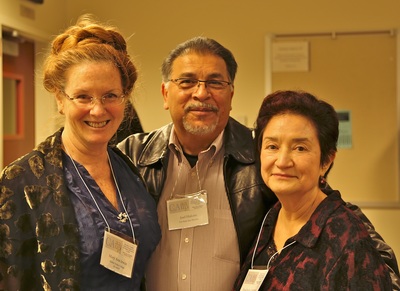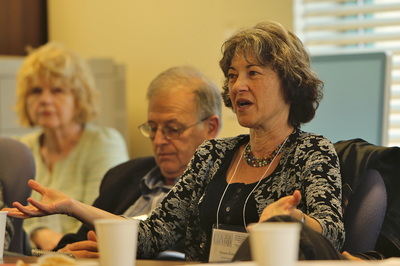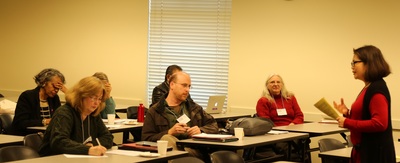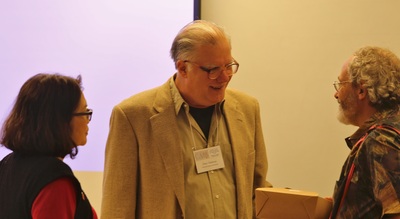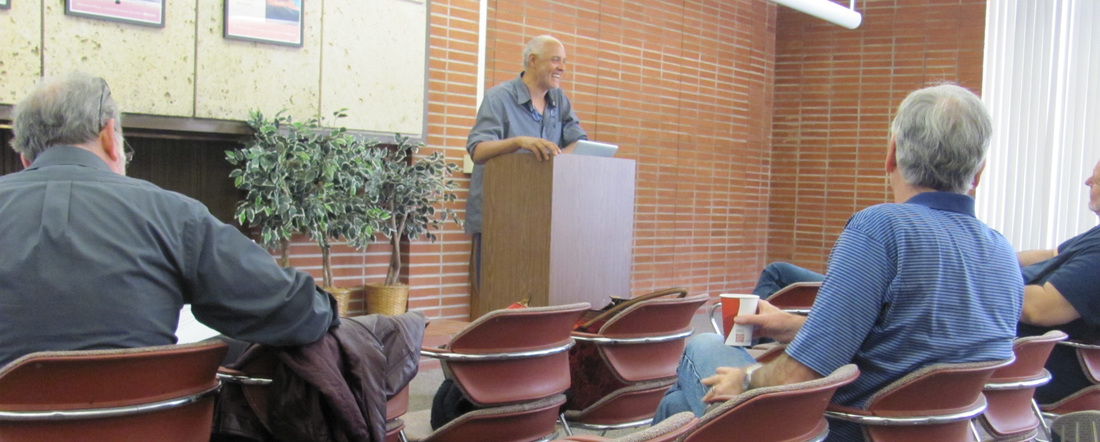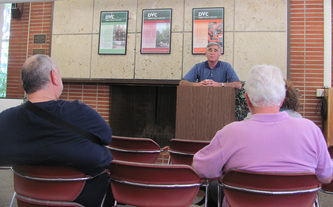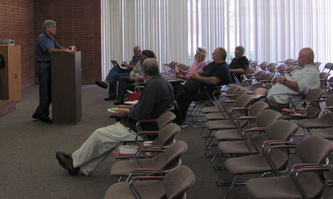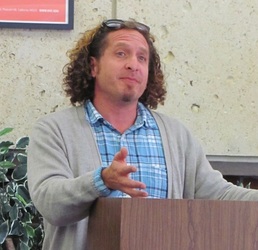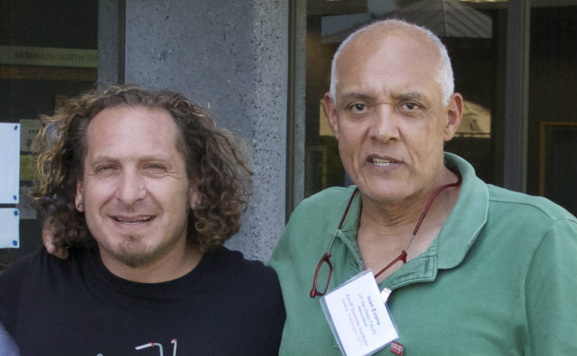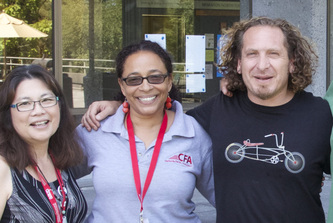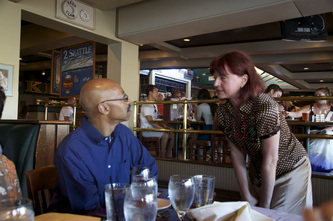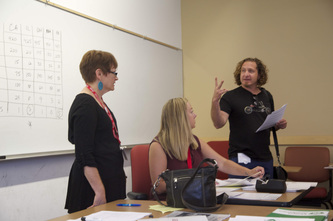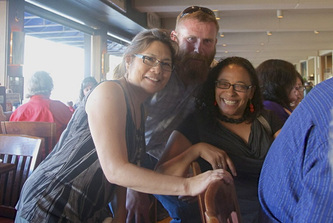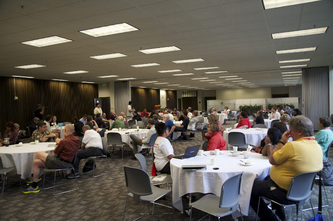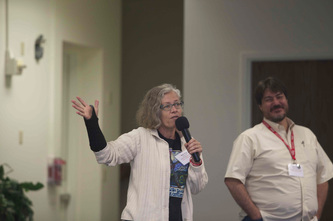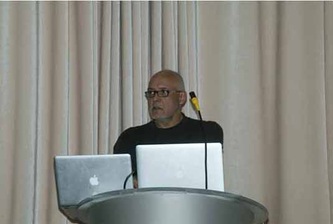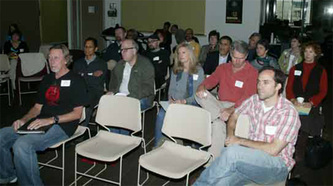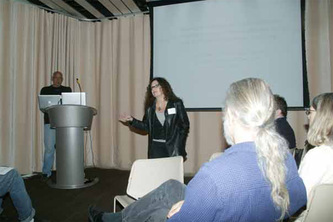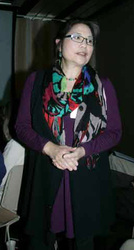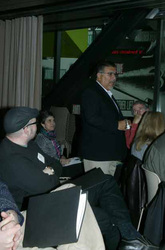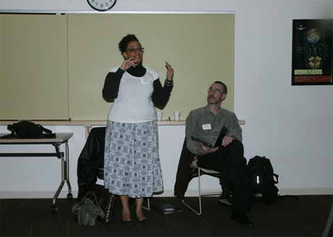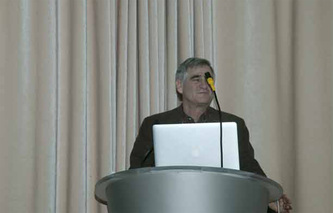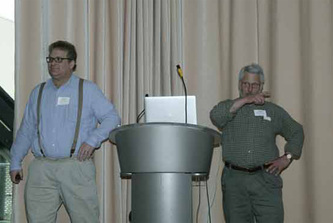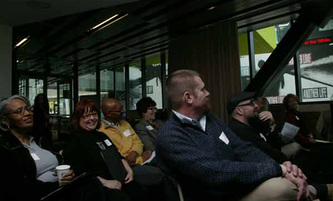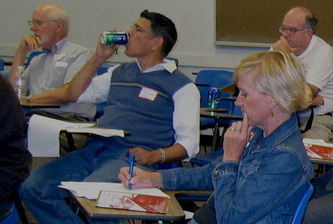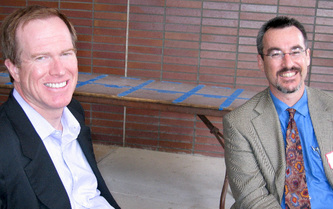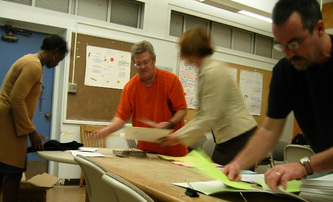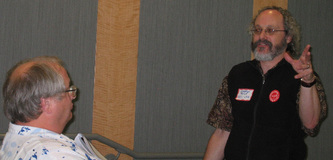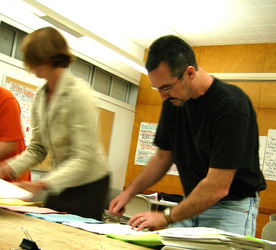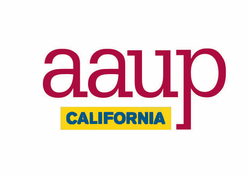
We encourage our members to attend national AAUP events. The national AAUP sponsors exciting, informative workshops, meetings, and activities year-round, like the AAUP Annual Conference and the AAUP-CBC Summer Institute. These events are a great way to make valuable professional connections, to get inspired, learn more, and even make new friends. Click here to visit the AAUP website.
REGISTER NOW FOR THE AAUP SHARED GOVERNANCE CONFERENCE - JUNE 14 - JUNE 18, 2021
www.aaup.org/2021-shared-governance-conference-registration (member log-in required)
The conference is scheduled to run online from Monday, June 14, to Friday, June 18, and is free for members. In addition to paper presentations, the conference will include panels, plenary presentations, and workshops for current and future governance leaders. Each day there will be events at 1 p.m. and 3 p.m. (eastern time). The 3 p.m. slot is for paper panels and the schedule for the 1 p.m. events is as follows:
www.aaup.org/2021-shared-governance-conference-registration (member log-in required)
The conference is scheduled to run online from Monday, June 14, to Friday, June 18, and is free for members. In addition to paper presentations, the conference will include panels, plenary presentations, and workshops for current and future governance leaders. Each day there will be events at 1 p.m. and 3 p.m. (eastern time). The 3 p.m. slot is for paper panels and the schedule for the 1 p.m. events is as follows:
- Monday: An overview of the AAUP governance investigation related to the COVID-19 pandemic. Michael Bérubé, Pennsylvania State University, and Michael DeCesare, Merrimack College, co-chairs of the investigating committee.
- Tuesday: A panel on governance at Historically Black Colleges and Universities led by Glinda Rawls, Western Michigan University.
- Wednesday: Results of the 2021 AAUP Shared Governance Survey. Hans-Joerg Tiede, AAUP Director of Research.
- Thursday: A workshop on shared governance. Greg Scholtz and Mark Criley, AAUP Department of Academic Freedom, Tenure, and Governance.
- Friday: Closing Plenary. Irene Mulvey, Fairfield University, AAUP President.
Have you made your plans for the summer yet? You should count on spending a few days in July with the AAUP at this year’s Summer Institute Online.
I’d like to be honest with you—the pandemic’s challenges are still with us, among the many other challenges facing higher education. But I know you agree that we can face them together when we equip ourselves with the knowledge and skills to fight back and win. There has never been a better moment than now to learn the grassroots organizing skills our unions and advocacy chapters need to resist the relentless attacks on higher education.
For all those reasons and more, we are excited to bring Summer Institute to your computer screen on Tuesday and Thursday afternoons from July 6–29, so that you can join hundreds of higher education activists like you from all over the country for hands-on workshops and panels on defending shared governance, organizing and bargaining to win on your issues, and fighting for a New Deal for Higher Education.
Click here for registration information . You can see the curriculum from last year's Summer Institute Online here.
See you soon,
David Kociemba
East Coast Organizer
I’d like to be honest with you—the pandemic’s challenges are still with us, among the many other challenges facing higher education. But I know you agree that we can face them together when we equip ourselves with the knowledge and skills to fight back and win. There has never been a better moment than now to learn the grassroots organizing skills our unions and advocacy chapters need to resist the relentless attacks on higher education.
For all those reasons and more, we are excited to bring Summer Institute to your computer screen on Tuesday and Thursday afternoons from July 6–29, so that you can join hundreds of higher education activists like you from all over the country for hands-on workshops and panels on defending shared governance, organizing and bargaining to win on your issues, and fighting for a New Deal for Higher Education.
Click here for registration information . You can see the curriculum from last year's Summer Institute Online here.
See you soon,
David Kociemba
East Coast Organizer
The 18th Annual Meeting of the California AAUP
TEACHING, LEARNING, AND CREATING EQUITY AT A DISTANCE
the FIRST EVER CA-AAUP NO TRAVEL meeting took place online via Zoom
FRIDAY, MARCH 12 &
SATURDAY, MARCH 13, 2021
DESCRIPTIONS OF THE 3 SESSIONS
Session 1: The Union & Struggle for Ethnic Studies: California’s Continuing Struggle
Moderated by Charles Toombs (Africana Studies, San Diego State and California Faculty Association President)
Panelists:
- Theresa Montaño ( Chicana/o Studies Cal State University, Northridge)
- Melina Abdullah (Pan-African Studies, Cal State University Los Angeles)
- Melissa Moreno (Ethnic Studies, Woodland Community College)
- Evan Wade (Ethnic Studies, San Joaquin Delta Community College)
In 2020, California’s AB 1460, supported and sponsored by the California Faculty Association became law. Every student in the CSU will be required to take one Ethnic Studies course before graduating from the largest four-year public higher education system in the nation. As we write this proposal, California’s Community College system is also engaged in developing and implementing Ethnic Studies courses. Ethnic Studies faculty, students and activists have been engaged in the adoption and implementation process, as activists, organizers and faculty leaders. This process has required the broad participation of faculty across California during the worst pandemic in global history.
During this session, we described models of organizing and implementation involving Ethnic Studies faculty activists across disciplines, campuses and institutions of higher education. The participants also shared their continued experiences with racism and discrimination, as they fight to secure a space for genuine Ethnic Studies in the academy. Presenters shared successful models for collaborative and productive relationships between Ethnic Studies faculty, members of academic senate and faculty unions. Finally, faculty of color involved shared how their collective working relationships help facilitate the hostile campus climates they negotiate..
Session 2: Organizing During a Pandemic
Workshop led by Shawn Fields, AAUP Western Lead Organizer
This pandemic has impacted both faculty working conditions and how faculty advocate and organize themselves and their colleagues around these conditions. Still, faculty across AAUP chapters have found ways to engage and activate colleagues as well as make important gains for themselves. This workshop detailed some of these wins and how to apply these lessons, tactics, and strategies to your chapter. Shawn Fields is the Western Region lead organizer for the AAUP. Her work centers on collaborating with and providing support for advocacy and collective bargaining chapters, their members, and their organizing efforts.
DOWNLOAD Shawn Fields' PRESENTATION: ORGANIZING DURING A PANDEMIC
| organzing_during_a_pandemic.pdf | |
| File Size: | 360 kb |
| File Type: | |
Session 3: At a Distance: Articulating A Higher Ed Perspective on Remote Instruction
Moderated by Diane Klein, CA- AAUP, Vice President for Private Colleges and Universities; Lecturer, Dale E. Fowler School of Law, Chapman University
Speakers:
DOWNLOAD Jonathan Poritz' PRESENTATION HERE
Moderated by Diane Klein, CA- AAUP, Vice President for Private Colleges and Universities; Lecturer, Dale E. Fowler School of Law, Chapman University
Speakers:
- Jesse Drew, Professor, Cinema and Digital Media, UC Davis; CA-AAUP Vice President for the University of California
- Vanessa Lopez-Littleton, Associate Professor and Chair of the Department of Health, Human Services, and Public Policy at California State University, Monterey Bay
- Jonathan Poritz, Associate Professor of mathematics and OER Coordinator at Colorado State University Pueblo, a four-year, regional comprehensive university in the other CSU system
DOWNLOAD Jonathan Poritz' PRESENTATION HERE
| poritz_remote_instruction.pdf | |
| File Size: | 287 kb |
| File Type: | |
meet our presenters
17th Annual Meeting of the California AAUP
explored the theme:
Restoring Faculty Leadership to Strengthen California Colleges and Universities
from 8:30 AM to 5:00 PM on SATURDAY, FEB. 22, 2020
at Mosher Alumni House on the campus of the
University of California Santa Barbara.
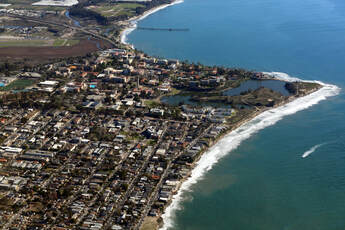 University of California, Santa Barbara
University of California, Santa Barbara
some photos from the 17th Annual Meeting of the CA-AAUP
PROGRAM SCHEDULE
8:30 – 9:15. Check-in & Continental Breakfast
9:15 - 9:30. Welcome by SBFA / CA-AAUP President Claudio Fogu
9:30 – 11:00. Opening Panel: “Sharing governance in unionized and non-unionized environments”
11:45 – 12:15. First plenary session
12:15 – 1:30. Lunch
1:30 – 3:00. Second Panel: “Sharing governance among faculty”
3:45 – 4:30. Plenary drafting of Decalogue of Best Governance Practices
4:30 – 5:00. Business meeting and Steps Forward
8:30 – 9:15. Check-in & Continental Breakfast
9:15 - 9:30. Welcome by SBFA / CA-AAUP President Claudio Fogu
9:30 – 11:00. Opening Panel: “Sharing governance in unionized and non-unionized environments”
- Kum-Kum Bhavnani, Chair, Academic Senate, University of California
- Chris Sinclair, President, United Academics, University of Oregon
- Diane Klein, Professor, University of La Verne College of Law
- Moderator: Steven Filling, President-Elect, CA-AAUP
11:45 – 12:15. First plenary session
12:15 – 1:30. Lunch
1:30 – 3:00. Second Panel: “Sharing governance among faculty”
- Julie Bruno, Past President, Academic Senate for California Community Colleges
- Catherine Nelson, Chair, Academic Senate of the California State University
- Mia McIver, President, UC-AFT
- Moderator: Claudio Fogu, President, CA-AAUP
3:45 – 4:30. Plenary drafting of Decalogue of Best Governance Practices
4:30 – 5:00. Business meeting and Steps Forward
photos from the 16th annual meeting of the ca-aaup
at csu maritime academy
comments from attendees at 16th annual Meeting
Thank-you for the opportunity to participate. I believe I have a new perspective about the possibilities for our chapter. Having received travel funds to participate at the 16th Annual Meeting of the CA-AAUP I believe we have actually accomplished much and look forward to a continued level of engagement. Furthermore, as we return from the conference, we are excited to focus on the following initiatives: building a new cohort of leaders for the chapter, continue to pressure university administrators as we transition to a new university president. Reyna Garcia Ramos
There were many aspects of the meeting that were beneficial and will influence my activities and advocacy. The conversations greatly increased my empathy for and understanding of the challenges of adjunct faculty. After Henry Reichman's address I have a deeper understanding of the concept of academic freedom. I feel more confident about our rights to speak and be heard, not only in the classroom but in conversations with administrators. Barbara Ingram
There were many aspects of the meeting that were beneficial and will influence my activities and advocacy. The conversations greatly increased my empathy for and understanding of the challenges of adjunct faculty. After Henry Reichman's address I have a deeper understanding of the concept of academic freedom. I feel more confident about our rights to speak and be heard, not only in the classroom but in conversations with administrators. Barbara Ingram
saturday, March 2, 2019
16th Annual Meeting of the CA-AAUP
@CSU Maritime Academy in Vallejo, CA
200 Maritime Academy Drive
" Are Academic Freedom & Shared Governance One and the Same ?"
16th Annual Meeting of the CA-AAUP
@CSU Maritime Academy in Vallejo, CA
200 Maritime Academy Drive
" Are Academic Freedom & Shared Governance One and the Same ?"
KEYNOTE SPEAKER: Henry Reichman
chair, AAUP Committee A on Academic Freedom and Tenure
keynote topic:
"The Future of Academic Freedom"
click here to order Professor Reichman's book The Future of Academic Freedom
https://jhupbooks.press.jhu.edu/content/future-academic-freedom
Featuring these timely workshops, led by local and national faculty leaders and activists:
ACADEMIC FREEDOM BEYOND THE ACADEMIC SENATE: The case of UC Librarians
CREATING JUST SPACES ON CAMPUS: Forging lasting alliances with communities and students
SERVICE V. GOVERNANCE: Using Pacific Lutheran's NLRB categories to evaluate your University's faculty governance documents & structures
FAIR USE FOR ACADEMICS: What rights professors have & why they are underutilized
WORKSHOP DESCRIPTIONS
Academic Freedom beyond the Academic Senate
Faculty take their Academic Freedom for granted when they form topics of inquiry, conduct research, determine course content, speak in the classroom, and exercise their shared governance responsibilities. What protections exist for the ever-increasing number of non-faculty academic job titles employed by universities and colleges, who also have clear academic responsibilities? Their ability to speak freely with protection from their employers varies across the academy. What risks do they currently face? What new protections can labor unions secure? This panel will look at the active battles to protect the principle of academic freedom among librarians, researchers, and other non-faculty academic workers.
Panel members (listed alphabetically)
Martin Brennan is the Copyright Librarian at UCLA, and is leading the communications efforts of the bargaining team for UC-AFT Unit 17 Librarians. The librarians are negotiating for Academic Freedom rights for their unit, among other issues.
Blanca Missè is an Assistant Professor and CFA board member at San Francisco State University. Her chapter has drafted two very interesting statements about how to expand academic freedom and how to respond to far right mobilization around free speech.
Adam Siegel is Bibliographer and Subject Specialist Librarian at UC Davis, also contributing to the bargaining team for UC-AFT Unit 17 Librarians, and has served on the UC Davis Senate / Federation Academic Freedom Committee.
Creating Just Spaces on Campus: forging lasting alliances with communities and students
This panel of faculty who have participated in interesting organizing efforts that have been occurring around California will explore opportunities and challenges of the current political environment. We’ll look at examples of campus movements on the frontlines and draw out lessons to inform current and coming battles against privatization and for increased racial, economic and gender justice on our campuses.
workshop leader: Jason Elias has been a labor and community organizer for over 20 years and is the Western Regional Coordinator for the AAUP
Panel members: Molly Talcott, Professor Sociology, Cal State LA and Associate Vice President (South) of the California Faculty Association; and Cal State LA Chapter President
Alejandra Marchevsky, Professor of Liberal Studies, Director, Program in Women, Gender, and Sexuality Studies at Cal State LA, and former Faculty Rights Chair for the Cal State LA chapter of CFA
James Martel, Professor of Political Science, and CFA Chapter President, San Francisco State University
Service v. Governance: Using Pacific Lutheran's NLRB Categories To Evaluate Your University's Faculty Governance Documents and Structures
The traditional promotion criteria for tenure-eligible faculty are teaching, scholarship, and something called "service." Many full-time non-tenure eligible faculty also have "service" obligations. How does committee service, on the various committees and faculty bodies found at most universities and academic units, relate to the shared governance rights and obligations of faculty members, without which we are not "managerial" employees (and are thus entitled to bargain collectively - aka, to form a union)? The answer is to be found in the five categories created by the NLRB in Pacific Lutheran Univ. and SEIU, Local 925 for evaluating whether the faculty exercise a managerial level of governance: the three primary categories (academic program, enrollment management, finance) and the two secondary categories (academic policy, personnel policy), into which nearly all faculty service work can be fitted. This workshop, led by a law professor and her non-law-school university colleagues, will discuss this important NLRB decision, how to communicate its important holdings to non-lawyers, and how to evaluate the governance documents and structures at your institution from the point of view of these categories. It will also help you enable your faculty to understand why faculty do so much non-governance service work, while more and more management and control is vested in administrators, whose institutional interests are served by obscuring rather than clarifying this important distinction.
workshop leaders: Prof. Diane Klein, University of La Verne College of Law Prof. Klein has been a law professor since 2000, and has taught at private and public institutions in California, Texas, Florida, and New York. Her areas of legal expertise include the law of property, wills and trusts, professional responsibility, and anti-discrimination law. She has played a key role in drafting governance documents at her institution that protect faculty (in all employment categories).
Prof. Matthew Witt, has taught at the University of La Verne in the College of Business and Professional Management since 2001. Before that, he taught on contract one year at Portland State University following the completion of his dissertation on neighborhood governance processes in Portland. Dr. Witt's area of expertise is in the area of racism in governance processes at the local level. His published work appears in several public administration journals.
Fair Use for Academics
The doctrine of fair use has long permitted academics to use copyrighted material without permission or payment, both in the classroom and for research and scholarship. In recent years, numerous communities of practice (such as documentary filmmakers and libraries) have begun to make fair use routinely and reliably. Yet for many in academia, fair use remains opaque, underutilized, and often out of reach, with significant implications for academic freedom. In this session, Professor Jack Lerner and students in the UCI Intellectual Property, Arts, and Technology Clinic at UC Irvine School of Law will explain how professors and administrators can make fair use appropriately and safely. They will also engage the audience in a discussion about the barriers to fair use, and the ways it could enable more robust scholarship and teaching.
workshop leader: Jack Lerner is a Clinical Professor of Law at the UC Irvine School of Law. Professor Lerner works to find solutions to problems at the intersection of law and technology, particularly how technology law and policy affect creative expression and innovation. He has written and spoken widely on copyright, privacy and other areas of technology law. He is Director of the UCI Intellectual Property, Arts, and Technology Clinic, where law students counsel and represent authors, filmmakers, policymakers, innovators, nonprofit organizations, and others on a range of IP and technology issues, including a substantial fair use practice.
co-panelists:
Olu Agbelemose and Kris Martinez
---------------------------------------------------------------------------------------------------------------------------------------------
________________________________________________________________________
Are Shared Governance and Academic Freedom One and the Same?
16th Annual CA-AAUP Meeting Schedule CSU Maritime Academy March 2, 2019
9:30
Check-in + coffee/tea, bagels, pastries, fruit
Compass Room 2
10:00
Welcome from Claudio Fogu, President, CA-AAUP and representative from CSU Maritime Academy Chapter, AAUP
Compass Room 2
10:30
Workshop 1: Creating Just Spaces on Campus: Forging lasting alliances with communities and students. Workshop leader: Jason Elias. Panelists: Molly Talcott, Alejandra Marchevsky, James Martel
Compass Room 3
10:30
Workshop 2: Academic Freedom Beyond the Academic Senate.
Panel members: Martin Brennan, Blanca Missé, Adam Siegel
Compass Room 1
12:00
Lunch (included with registration fee)
Cafeteria 1st floor
1:00
CA-AAUP Business Meeting
Compass Room 2
1:45
Refreshment Break: coffee & cookies
Compass Room 2
2:00
Keynote Talk: Henry Reichman: The Future of Academic Freedom*
Compass Room 2
3:00
Workshop 3: Service v. Governance: Using Pacific Lutheran’s NLRB categories to evaluate your University’s faculty governance documents & structures. Panelists: Diane Klein, Matthew Witt.
Compass Room 1
3:00
Workshop 4: Fair Use for Academics.
Workshop leader: Jack Lerner. Co-panelists: Kris Martinez and Olu Agbelemose.
Compass Room 3
4:30
Closing: Accomplishments and Steps Forward
Compass Room 2
Scenes from the 15th annual meeting of the CA-AAUP - feb. 10, 2018
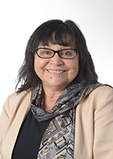
The 15th Annual Meeting of the California AAUP
Building and Strengthening Shared Governance: Challenges & Solutions
was held from 9:30 AM to 5:30 PM on SATURDAY, FEBRUARY 10, 2018 on the West Los Angeles Graduate Campus of Pepperdine University at 6100 Center Drive, Los Angeles.
Faculty from all over California participated in what was a high level discussion about current issues facing higher education in our state.
The keynote speaker, Theresa Montaño, is Vice President of the California Teachers Association and Professor of Chicana/Chicano Studies at CSU Northridge. The title of her talk is
Faculty Resistance and Voice: Shared Governance in Troubling Times.
Smaller workshops provided opportunities for in-depth examination of specific concerns and strategies for positive change. The program included 4 workshops designed to support current and upcoming chapter development efforts at the local level and to help chapters integrate their efforts with available state Conference resources. This meeting was an excellent opportunity for AAUP members to develop organizing and shared governance strategies that will serve them well into the future.
Workshop topics :
- Efforts to Improve Shared Governance at Private Universities
- This workshop is organized by officers of the AAUP chapters of Pepperdine University and Whittier College, with Hank Reichman, First Vice President of AAUP, serving as round table moderator. In a case study format, we present the story of our faculties efforts to achieve not only a “place at the table,” but recognition that our voice should have weight in decision-making processes. Representatives from other schools will share their stories and together we will clarify catalysts and obstacles in meeting AAUP standards of shared governance. We hope our conversation together will help us develop not only strategies for future efforts, but an inter-university support network among AAUP chapters in California’s private universities.
- workshop leaders: Barbara Ingram, Maire Mullins, Reyna Garcia Ramos, Anne Sebanc
- This workshop is organized by officers of the AAUP chapters of Pepperdine University and Whittier College, with Hank Reichman, First Vice President of AAUP, serving as round table moderator. In a case study format, we present the story of our faculties efforts to achieve not only a “place at the table,” but recognition that our voice should have weight in decision-making processes. Representatives from other schools will share their stories and together we will clarify catalysts and obstacles in meeting AAUP standards of shared governance. We hope our conversation together will help us develop not only strategies for future efforts, but an inter-university support network among AAUP chapters in California’s private universities.
- CSI CSU: Death by Executive Order. A Cautionary Tale of the Attempted Murder of Shared Governance
- We’ll have the Academic Senate, CSU Chair, one of the 23 campus Senate Chairs, a former ASCSU Chair, the Chair of the ASCSU Faculty Affairs Committee and one or two others providing their perspective on the shared governance process in the CSU as exemplified by the development, issuance and implementation of Executive Orders [Chancellor directives] on General Education and Remediation. We’ll provide an overview of events and move into discussion of a] what we learned from this, b] how we might move forward toward genuine governance, and c] what this means for shared governance practice in the CSU and elsewhere
- workshop leaders: Steven Filling and Karen Davis
- Guided Pathways: Challenges and Solutions for Shared Governance
- What is this intrepid statewide initiative that endeavors to redesign community colleges and dramatically improve student success? Who is behind the project and how is it being funded? What is the role of faculty in its implementation? Are we to be partners in this restructuring scheme or hostages to a curricular redesign process that is preordained? What are the alternatives to the Guided Pathways model that faculty leaders might propose? This workshop will introduce participants to the Guided Pathways project and then invite response and discussion on its implementation in California.
- workshop leader: Katherine Graham
- The $48 Fix, a carefully-researched report, proves that California can afford to restore top-quality public higher education—and make the system 100% tuition-free.
The 1960 Master Plan, California’s three-segment public system of higher education — the Community Colleges, the California State University and the University of California — was for decades the opportunity-and-growth blueprint for California’s prosperity. As the systems were strengthened by social movements pressing for broader inclusion, the Master Plan offered a way to fund access and quality at the same time while supporting racial equity. But the Master Plan has been eroded by decades of public funding cuts, tuition increases, and rising student debt. One result is a shortfall of college-educated employees; another is endangered social justice. The workshop brings together two of the report’s authors to discuss its findings and show why threats to prosperity, equity, research, and personal development are not financially necessary. - workshop leaders: Jonathan A. Abboud and Christopher Newfield
The 14th Annual Meeting of the California Conference of the AAUP was held on March 18, 2017 on the CSU Maritime campus in Vallejo.
Please visit the home page for details: http://www.caaaup.org/
PHOTOS from the 14TH ANNUAL MEETING OF THE CA-AAUP
click on image to enlarge and to view captions
Please visit the home page for details: http://www.caaaup.org/
PHOTOS from the 14TH ANNUAL MEETING OF THE CA-AAUP
click on image to enlarge and to view captions
photos by Karen Davis and Janis Crystal Lipzin
SAT. FEB. 20, 2 0 1 6
San Diego State University
5500 Campanile Dr, San Diego, CA 92182
13th Annual Meeting of the California Conference of the AAUP
Online registration has ended for the 13th annual meeting of the CA-AAUP which was held at the San Diego State University all-day Saturday, February 20, 2016.
Our theme was the "AAUP and the Battle for Quality Higher Education."
The keynote speaker was Rudy Fichtenbaum, AAUP President, who addressed the role of privatization in higher education.
more information available here
California AAUP 12th Annual Meeting
Advancing Social Justice in an Era of Intolerance
California State University, Maritime
Vallejo, California
New Dining Facility Building #14 on map, 2nd floor
Compass Room 2
Saturday, March 14, 2015
8:30 AM - 5:30 PM
please scroll down for updated schedule of events
Keynote Speaker:
Cecil Canton
Member of the CFA Board of Directors, Associate VP and Chair of the CFA Council for Affirmative Action, Executive Committee Member of AAUP, Chair of the Committee on Historically Black Institutions and Scholars of Color
"(Re)Affirming Civil Rights, Social Justice and Affirmative Action: The Development of the California Faculty Association Council for Affirmative Action"
Dr. Canton's presentation reflected on the creation, development and impact of the Council for Affirmative Action on CFA's mission and action agenda. Social Justice milestones were highlighted and recommendations for enhancing AAUP's and other union efforts to overcome intolerance and to be more inclusive were discussed and shared.
plus these timely workshops, led by local and national faculty leaders and activists:
- State Conference Committee "A" Principles of Academic Freedom & Tenure
workshop leader: Joerg Tiede - Building Diversity, Building Chapter Power
workshop leader: Scott Saarheim - Organizing a Chapter: Inspiring Case Histories
workshop leader: Jason Elias - The Accreditation Struggle at City College of San Francisco: Faculty Organizing with Students and the Community to Save Our College
workshop leader: Kimberly R. King with panelists Vickie Legion, Tarik Farrar, and Lalo Gonzalez.
https://eventbrite.com/event/1567088954/
|
MEETING SCHEDULE of EVENTS March 14, 2015 9:30 AM Check-in, coffee/tea & pastries in Compass Room 2 New Dining Bldg. #14, Cal State U. Maritime 10:00 AM Welcome: Rosalinda Quintanar, President, CA-AAUP & Scott Saarheim, President CFA, Maritime Chapter Compass Room 2 10:30 AM Workshop 1: State Conference Committee A Principles Compass Room 1 Workshop 2: Building Diversity, Building Chapter Power Compass Room 3 Noon Lunch (provided to all registered attendees) 1:30 PM Keynote Speech: (Re)Affirming Civil Rights, Social Justice and Affirmative Action: The Development of the California Faculty Association Council for Affirmative Action - Cecil Canton - Compass Room 2 2:15 PM Refreshment Break 2:30 PM Workshop 3: Organizing a Chapter: Inspiring Case Histories Compass Room 3 Workshop 4: The Accreditation Struggle at City College of San Francisco: Faculty Organizing with Students and the Community to Save Our College Compass Room 1 4:00 PM Business Meeting for members of CA-AAUP Compass Room 2 4:30 PM Reception all registered attendees are invited |
|
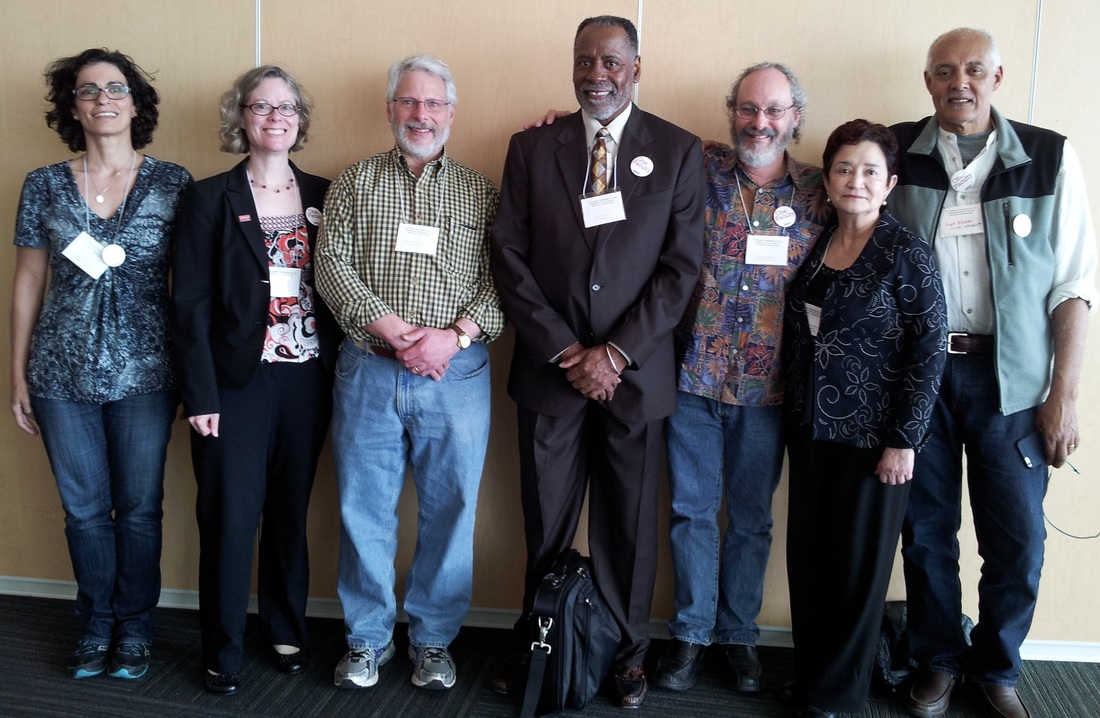
left to right:
Cynthia Trevisan, CSU Maritime; Julie Schmid, AAUP Executive Director; Rudy Fichtenbaum, AAUP President; Cecil Canton, keynote speaker, Illinois Wesleyan University; Jonathan Karpf, San Jose State & California Faculty Assn.; Rosalinda Quintanar, CA-AAUP President, Ivan Evans, Ca-AAUP V.P. for University of California, UC San Diego at the 12th Annual Meeting of the California AAUP at CSU Maritime 2015.
photos by Janis Crystal Lipzin and Ivan Evans
CA-AAUP attended
the Faculty Association of the California Community Colleges (FACCC) Advocacy & Policy Meeting
in Sacramento, California,
March 2-3, 2014.
to discuss ways to
"Change the Narrative on California Community Colleges."
images from the 11th annual meeting of the CA-AAUP
Santa Clara University - February 8, 2014
faculty voices: shared strategies for CA higher education in 2014
Click on a thumbnail for a full-sized image & caption.
photos by Karen Davis, Ivan Evans, and Kimberly King
photos by Karen Davis, Ivan Evans, and Kimberly King
11th CA-AAUP Annual Meeting, 2014
faculty voices: shared strategies for ca higher education in 2014
SCHEDULE for February 8, 2014 CA-AAUP
Annual Meeting, Santa Clara University
FACULTY VOICES: SHARED STRATEGIES for
CALIFORNIA HIGHER EDUCATION IN 2014
8:30 Check-in at Arts & Sciences Building Room 133 + coffee/tea & muffins
9:00 Welcome: Mary Ann Irwin + Diane Dreher Room 129
9:45 Morning Speaker: Elizabeth Hoffman Room 129
11:00 Workshop 1 Room 128
Workshop 2 Room 133
12:30 Lunch (included with registration fee) Room 133
2:00 Afternoon Speaker: Bob Samuels Room 129
2:45 Refreshment Break Room 133
3:00 Workshop 3 Room 133
Workshop 4 Room 128
4:30 Business Meeting for members of CA-AAUP Room 129
DETAILS ABOUT 2014 ANNUAL MEETING WORKSHOPS & SPEAKERS
MORNING SPEAKER - ELIZABETH HOFFMAN 9:45AM
"Organizing & Equity in a Two-Tier System: The Experience of the California Faculty Association"
Elizabeth Hoffman is Emeritus Lecturer Faculty, English Department, California State University, Long Beach, former statewide officer of the California Faculty Association, former member of the AAUP National Council, and former delegate to the Los Angeles County Federation of Labor.
AFTERNOON SPEAKER - ROBERT SAMUELS 3:00PM
"Making Public Education Free"
--a discussion of how to fund public higher education and make faculty positions secure while increasing the quality of undergraduate education
Bob Samuels is President of the University Council - AFT and a lecturer at the University of California, Santa Barbara. He is also the author of the popular blog, Changing Universities, and the book Why Higher Education Should be Free.
2014 WORKSHOP DETAILS
When you register, you will be asked to select 1 morning and 1 afternoon workshop to attend.
WORKSHOP 1: 11 AM
FACULTY ORGANIZING FOR CHANGE AT PRIVATE COLLEGES & UNIVERSITIES: SUCCESSES, CHALLENGES, & LESSONS
This session will include a roundtable discussion on faculty organizing at private universities for a more robust role in shared governance --How can we promote a stronger faculty voice in governance at private colleges and universities? We'll share successful strategies that build solidarity and make a positive difference, and pose problematics and challenges to this work.
Workshop 1 Participants:
Diane Dreher Professor of English, Santa Clara University and President, AAUP Chapter, Santa Clara University
Susan Esterly Assistant Professor and MA Clinical Training Coordinator, Sophia University, Interim President, AAUP Chapter, Sophia University
Jason Elias Western Regional Coordinator, AAUP
WORKSHOP 2: 11 AM
DEFINING ACADEMIC FREEDOM: WHO TEACHES, WHAT TO TEACH, & HOW TO TEACH
Faculty at San Jose State University discuss their perspective, views, and experiences in the changing landscape of teaching in higher education, from the face to face environment to online and hybrid courses. How do faculty control what they teach, where they teach, and how they teach?
Workshop 2 Participants:
Wendy Ng Professor and Chair, Sociology & Interdisciplinary Social Sciences Department, San Jose State University and California Faculty Association, AAUP - North Representative
Peter Hadreas Chair, Philosophy Department, San Jose State University
to be joined by other campus leaders
WORKSHOP 3: 3 PM
CONTINGENT FACULTY IN SHARED GOVERNANCE: BENEFITS AND PERILS
This workshop will explore benefits and perils of the inclusion of contingent faculty in governance within a system structurally set up to exclude temporary and adjunct faculty members as non-peers. The presenters share a conviction that academic freedom within educational institutions can thrive only when the precarious and marginalized status of contingent faculty is eliminated. Given recent nationwide increases in the numbers of contingent faculty and the complexities of integrating these faculty members into governance, how can best-practice strategies for inclusion be identified and implemented given the structural inequities already in place within the institution?
Mayra Besosa Lecturer in Spanish at Cal State San Marcos, Chair of the National AAUP Committee on Contingency & the Profession and CFA Campus Lecturer Rep, will summarize the Association's recommendation as articulated in its 2012 report on The Inclusion in Governance of Faculty Members Holding Contingent Appointments.
Karen Davis Lecturer in Film & Media Studies at Cal State Monterey Bay, California State University Statewide Academic Senator (currently its sole contingent faculty member) and CFA Campus Lecturer Rep, will describe statewide and campus-based efforts in the CSU, including Senate resolutions, contract language, and arbitration wins.
Jennifer Ruth Associate Professor of English, (and former Department Chair), Portland State University AAUP Executive Council, Faculty Senate, and Education Policy Committee member will present developments ather own institution as a case study in "benefits and perils" of advocating for inclusion in a system that sets tenure-track and non-tenure-track faculty as non-peers.
Half of the workshop period will be dedicated to questions & discussion.
WORKSHOP 4: 3 PM
FACULTY ACTIVISM WITH STUDENTS & COMMUNITY: RENEWING A COMMITMENT TO CA PUBLIC HIGHER EDUCATION
California's public higher education system offers high quality and diversity, but is becoming less and less accessible. Budget cuts, tuition increases, and the failure to adequately invest in faculty are threatening educational quality and access. This panel discussion will feature faculty, student, and community organizers who are working together to rebuild California's commitment to public higher education through grassroots activism, union organizing, and public policy/legislation.
Moderator: Kimberly R. King, Associate Professor, Psychology Department, California State University Los Angeles, California Faculty Association AAUP-South Representative
Panelist: Maurice Weeks Campaign Coordinator for the Alliance of Californians for Community Empowerment (ACCE). For the past 2 years Maurice has organized community led campaigns in the areas of Education, Predatory Debt, and Housing Justice that expose the unaccountability of wealthy Wall Street businesses and individuals and demand that they paytheir fair share to Re-Fund California. More recently Maurice has helped shape a campaign to stimulate local economies by demanding big banks write down principals on mortgages and that they renegotiate predatory debt with California municipalities. In 2009 Maurice earned a Bachelor's degree in Sociology and Peace and Conflict Studies from Swarthmore College. Originally from Newark, NJ, he currently lives in Oakland, CA.
Panelist: Mark Weirick Student Organizing Coordinator for the California Faculty Association CFA). Mark oversees CFA's student internship program across 11 CSU campuses in northern California where he mentors and develops the leadership and organizing skills of CFA's student interns as they work to preserve the mission of the CSU as "the People's University." The internship program has been responsible for the development of Students for Quality Education (SQE), a statewide student advocacy group that has chapters across 16 CSU campuses. SQE has played a critical role in many of CFA's campaigns, and has organized statewide walkouts, rallies, sit-ins, and most recently, was successful in lobbying for the defeat of a unit-cap fee proposal, as well as agitating for what became the eventual resignation of CSU Chancellor Reed. A graduate of CSU Monterey Bay, where he was once a CFA intern himself, Mark is currently on temporary assignment as a field representative for CFA.
Panelist: Vanessa Lopez Graduate Student organizer with the California Student Union movement (CASU)
Student Organizer with the California Student Union. Vanessa currently organizes students under a student unionist project with the goal or refunding and democratizing California's public education system. Vanessa has previously organized with the California Faculty Association and helped faculty win a fair contract campaign, with Students for Quality Education around tuition fee increases, and taken part in direct action and legislative campaigns to refund education and fight for union rights. Vanessa recently graduated from CSU Dominguez Hills with a Bachelor's in Labor Studies. She has also organized with Warehouse Workers United and the Los Angeles Country Federation of Labor around worker health, safety, and immigration issues.
Panelist: Vicki Legion, MPH has taught public health at City College of San Francisco since 1994, and works on setting up university transfer pathways for low-income, first-generation and under-represented students. She is active in the Save City College coalition of students, faculty and staff, and in the American Federation of Teachers local 2121. She helped coordinate an Education Justice statement, a ten-point program and vision statement for the college.
Panelist: Shanell Williams is a student leader in the movement to save City College of San Francisco. She was raised in San Francisco's Fillmore District and is a former foster care youth who has advocated for low income, underrepresented youth and their families for 10 years. She is currently attending City College of San Francisco and was elected as the current Student Trustee representing the 85,000 CCSF students. She was elected as President of Associated Students Council, Ocean Campus and VP of Communications. She is Region III External Affairs Senator for Student Senate for California Community Colleges and Northern Region Chair for the Black Caucus of the SSCCC. She is a 2013 San Francisco Bay Guardian Local Hero for her advocacy work at CCSF.
CA-AAUP Annual meeting, 2013
CA-AAUP held its last Annual Meeting at the University of California, San Diego, on Saturday, March 9, 2013. Our keynote speakers were Rudy Fichtenbaum (AAUP President and Professor of Economics at Wright State University) and Howard Bunsis (Chair, AAUP Collective Bargaining Congress and Professor of Accounting at Eastern Michigan University).
More than forty California educators joined in discussion and workshops on the Annual Meeting theme, “The Financial Crisis in California and Its Impact on Higher Education.”
Our one-day workshops included:
Preserving and Maintaining Participatory Governance
Faculty Take the Offensive: The Campaign for the Future of Higher Education
Preserving and Enhancing Academic Freedom
and
The University of Oregon Story: Faculty Unionize and Fight for A First Contract
More than forty California educators joined in discussion and workshops on the Annual Meeting theme, “The Financial Crisis in California and Its Impact on Higher Education.”
Our one-day workshops included:
Preserving and Maintaining Participatory Governance
Faculty Take the Offensive: The Campaign for the Future of Higher Education
Preserving and Enhancing Academic Freedom
and
The University of Oregon Story: Faculty Unionize and Fight for A First Contract
Diablo Valley college AAUP ChapTer presents film: "For Profit"
Your browser does not support viewing this document. Click here to download the document.
IMAGES FROM THE LAUNCH OF DVC-AAUP
PLEASANT HILL, CALIFORNIA
SEPTEMBER 20, 2013
HANK REICHMAN, 1ST VICE PRESIDENT OF AAUP, IVAN EVANS, PRESIDENT OF THE CALIFORNIA CONFERENCE OF AAUP, AND JASON ELIAS, AAUP WESTERN REGIONAL COORDINATOR, SPOKE TO A SMALL BUT ENTHUSIASTIC GROUP OF DIABLO VALLEY COLLEGE PROFESSORS ABOUT FOUNDING A NEW CHAPTER OF AAUP. DVC-AAUP IS CALIFORNIA'S FIRST COMMUNITY COLLEGE CHAPTER OF AAUP
PLEASANT HILL, CALIFORNIA
SEPTEMBER 20, 2013
HANK REICHMAN, 1ST VICE PRESIDENT OF AAUP, IVAN EVANS, PRESIDENT OF THE CALIFORNIA CONFERENCE OF AAUP, AND JASON ELIAS, AAUP WESTERN REGIONAL COORDINATOR, SPOKE TO A SMALL BUT ENTHUSIASTIC GROUP OF DIABLO VALLEY COLLEGE PROFESSORS ABOUT FOUNDING A NEW CHAPTER OF AAUP. DVC-AAUP IS CALIFORNIA'S FIRST COMMUNITY COLLEGE CHAPTER OF AAUP
images from the AAUP-CBC Summer Institute
Seattle, Washington
July 25-28, 2013
This was an extensive 4-day series of workshops and seminars designed to prepare the 230 attendees to organize their colleagues, stand up for academic freedom, & advocate for research and Teaching as the core priorities of higher education.
Images from the Ca-AAUP 10th Annual Meeting
San Diego, March 9, 2013
Photos by: Fred Lonidier
Images from the ca-aaup 5th Annual Meeting
Santa Monica College, October 4, 2008
Photos by: Janis Crystal Lipzin
Click on a thumbnail for a full-sized image & caption.
Click on a thumbnail for a full-sized image & caption.
